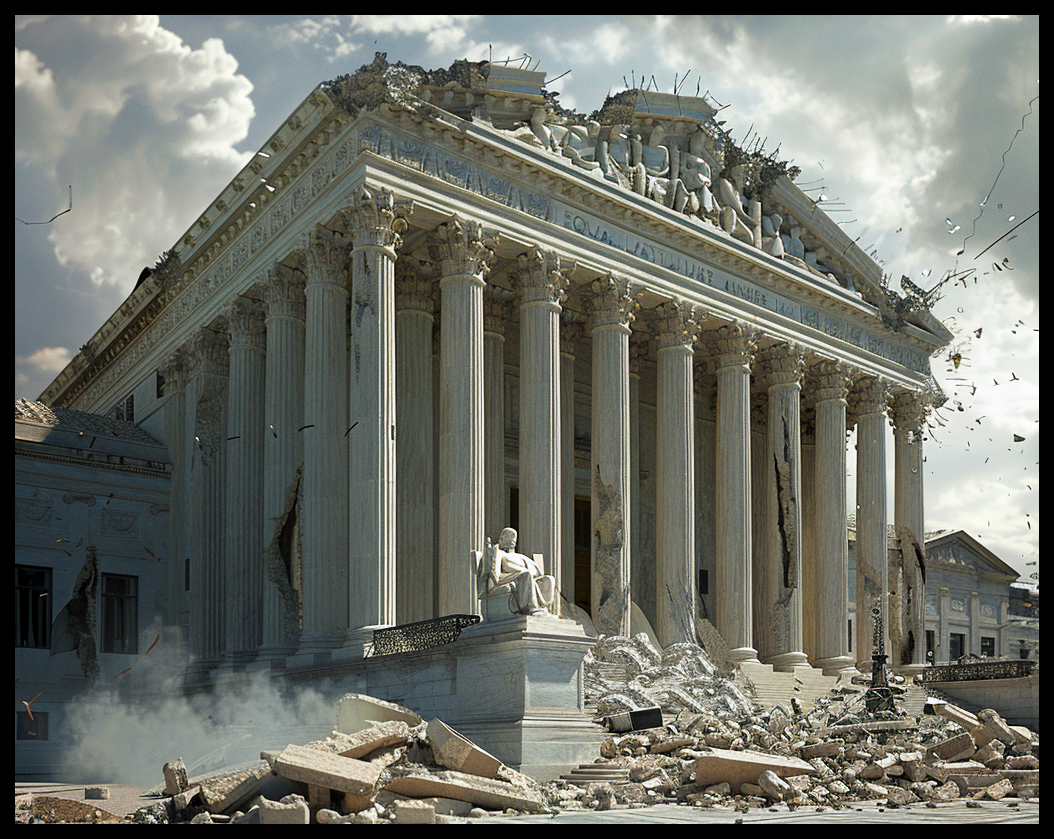
When questioned during confirmation hearings, the Republican-nominated members of the Supreme Court of the United States assured U.S. Senators that they would honor precedent. Although Democrats were probably focused on Roe v. Wade when they asked those questions, it turns out that the six had something else up their sleeves: the unitary executive or imperial presidency
In the last days of the 2023-24 session, the Court has eviscerated the power of agencies to write regulations; muzzled the SEC; made bribery of a public official legal if the “gratuity” is delivered after the official’s term of office; and criminalized homelessness when people have no shelter.
Its coup de grâce: naming the president king with the Court as his interlocutor (in defining what constitutes an official act).
Update (1:03 pm Pacific)
Monday, Trump immediately directed his lawyers to appeal his conviction on 34 New York State felonies. Those acts were clearly not “official” ones since he was a candidate at the time — not the incumbent president — when they occurred. (When will his lawyers be hit with wasting the court’s time?) His sentencing hearing
iswas next week: July 11th.Justice Juan M. Merchan has delayed Trump’s sentencing trial until September 18. Prosecutors did not object.
As former U.S. Attorney Joyce Vance writes: “If Nixon had known he had immunity like [the ruling 01 July 2024], he wouldn’t have resigned.”
From Justice Sotomayor, with whom Justice Sagan and Justice Jackson join, dissenting:
Today’s decision to grant former Presidents criminal immunity reshapes the institution of the Presidency. It makes a mockery of the principle, foundational to our Constitution and system of Government, that no man is above the law. Relying on little more than its own misguided wisdom about the need for “bold and unhesitating action’ by the President, ante, at 3, 13, the Court gives former President Trump all the immunity he asked for and more. Because our Constitution does not shield a former President from answering for criminal and treasonous acts, I dissent (emphasis added).
Apparently, a president can ask for an investigation into anyone or anything that’s in their way and have immunity from criminal prosecution. Trump can’t be prosecuted for trying to enlist DOJ in his scheme to steal an election. This falls within the core functions of the presidency bucket of official action [because] a president’s conversations with Justice Department officials fall within the president’s official duties and are hands-off…
The Court says that because a discussion of their duties between the president and vice president is “official conduct” Trump’s efforts to pressure Pence “to block certification of the election… involv[ed] official conduct,” so he is “at least presumptively immune from prosecution for such conduct.”
In so doing, the six Republican-appointed justices — all but two confirmed by Senators representing a minority of U.S. citizens — have declared that they have power unchecked by the other three branches.* This is without Consitutional direction, as the Constitution “elaborated neither the exact powers and prerogatives of the Supreme Court nor the organization of the Judicial Branch as a whole.”
I call these actions radical. The Court has broken from tradition as it effects “policies of extreme change.”
Contrary to what many people have come to believe, judicial supremacy is not in the Constitution, and does not date from the founding era. It took hold of American politics only after the Civil War, when the Court overruled Congress’s judgment that the Constitution demanded civil-rights and voting laws…
[I]n its infamous 1857 Dred Scott decision, [the Court interpreted] the Constitution to hold that the federal government lacked the power to abolish slavery anywhere in the United States. But rather than accept this novel assertion of judicial supremacy over Congress, the Republican Party responded with defiance. Indeed, Abraham Lincoln successfully ran for president on a platform of repudiating the Court with national legislation.
In his inaugural address, [Lincoln] remarked that “the candid citizen must confess that if the policy of the Government upon vital questions affecting the whole people is to be irrevocably fixed by decisions of the Supreme Court,” then “the people will have ceased to be their own rulers, having to that extent practically resigned their Government into the hands of that eminent tribunal (emphasis added).”
On Sunday, Donald Trump called for Liz Cheney to be put in jail.
So what do we do?
Joyce Vance? “We each have the opportunity to join Justice Sotomayor in dissenting when we vote in November.”
Heather Cox Richardson is calling on the majority of Americans to stand up, assert agency, push back to prevent the American story from reaching its end.
~~~
* Irony alert: one of those two, Samuel Alito, is linked — via flag flyinig at two homes — to Trump’s attempt to overthrow the election.
UPDATE: historian Kevin Kruse also describes describes the Court as “radical”
RELATED: Heather Cox Richardson on today’s SCOTUS decision: a warning about our “end story”
Talk to me: BlueSky | Facebook | Mastodon | Twitter
Known for gnawing at complex questions like a terrier with a bone. Digital evangelist, writer, teacher. Transplanted Southerner; teach newbies to ride motorcycles. @kegill (Twitter and Mastodon.social); wiredpen.com
















